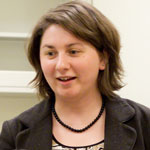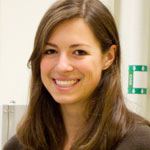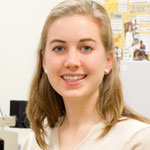Physics for the future
You are out for an afternoon jog. While glancing at your electronic shirt sleeve — checking your heart beat and blood pressure — you hear your cell ring. Reaching into your pocket, you unroll the phone and answer the call.
By 2015, plastic flexible electronics is estimated to be a $30 billion market, according to Oana Jurchescu, assistant professor of physics. The technology will make artificial skin, smart bandages, flexible displays and electronic wall papers that change pattern with a flip of the switch, everyday realities.
Participating in the development of these technologies are senior Katelyn Goetz and juniors Daniel David and Claire McLellan. The group works with Jurchescu in her lab, which is part of the physics department and the Center for Nanotechnology and Molecular Materials.
“What’s really cool about the research I’m doing is that professionals from the industrial sector can use the results to produce new products,” says David, who is from Sierra Madre, Calif. “It’s motivating to know that what I’m doing can potentially have an impact in the near future.”
Organic plastic electronics is a branch of electronics that deals with polymers and small molecules that are carbon-based. Traditional electronics rely on inorganic conductors such as silicon.
“For a long time, plastics were known to be insulators, but plastics can also conduct electricity,” explains Jurchescu, who joined the faculty in 2009. “This fast-growing field is likely to become a mainstay of the electronics of the future because it has unique attributes, such as low complexity processing and low-cost.”
Eager to share their research results and to learn more about other work in plastic electronics, Jurchescu encouraged her students to attend the Plastic Electronics Conference — one of the most prestigious conferences in the field. The three physics majors flew to Dresden, Germany, this fall to present their work. While there, the students met professionals from both academia and industry, including the 2010 Physics Nobel Prize laureate, Konstantin Novoselov, and H.K. Chung, director of advanced OLED technology at Samsung Mobile Display.
David says he made friends with researchers from all over the world. He hopes to collaborate with a Japanese chemist he met at the conference on some future experiments. “It was instructive and informative to participate in such an open exchange of ideas,” he says.
The trip, which took place in October, was sponsored by the Provost’s Office of Global Affairs and donations to the physics endowment by friends and alumni.
Categories: Experiential Learning, Mentorship, Research & Discovery, University Announcements
Media Contact
Wake Forest News
media@wfu.edu
336.758.5237






